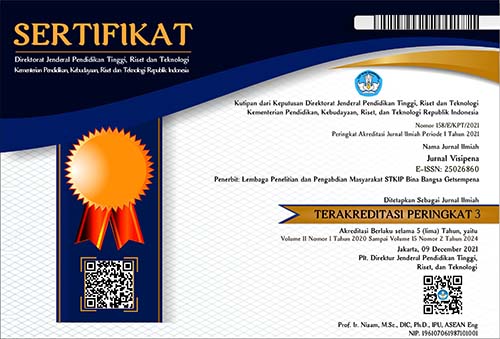IMPLEMENTING OF INFORMATION AND COMUNICATION TECHNOLOGY INTO ISLAMIC RELIGIOUS EDUCATION TEACHER AT DI SMP NEGERI 3 TELUKNAGA
Abstract
Integrating information and communication Technology (ICT) into learning has a very important role in facing the demands of the development of the modern world. This research underlines the role of education and training to increase PAI teachers' competence in ICT. This research aims to describe the level of integration and communication, and technology in PAI teacher training. This research was conducted at SMP Negeri 3 Teluknaga. This research was conducted at SMP Negeri 3 Teluknaga. The population in this study was 23 madrasa PAI teachers and two facilitators participating as informants. The data analysis technique uses the Miles and Huberman interactive model. The research results show that PAI madrasah teachers have integrated ICT but still need to expand to using presentations, especially PowerPoint. Second, age factors and technical problems are the main obstacles in implementing such integration compared to younger teachers, who tend to have a higher level of comfort with new technology because they are more familiar with the use of technology in their daily lives. The availability of ICT facilities at SMP Negeri 3 Teluknaga is classified as good. This research recommends that schools provide a lot of training and support to teachers to improve their mastery of technology and integrate it effectively into the learning process.
Downloads
References
Ahmad, H., & Shah, S. R. (2022). Teacher agency and professional development: A study on Cambridge English teacher program in the Arabian Gulf. Cogent Education, 9(1), 2080352.
Amarasinghe, S., & Brodacz-Geier, M. (2024). ICT-Enable Teacher Professional Development from the Pedagogical Dimension for 21st Century: A Preliminary Analysis of the ICT Integration of CONTESSA Modules BT - Empowering Education in Cambodia and Sri Lanka: Quality Improvement in Teaching and Learn (S. Hummel (ed.); pp. 153–161). Springer Fachmedien Wiesbaden. https://doi.org/10.1007/978-3-658-43306-2_10
Califf, C. B., & Brooks, S. (2020). An empirical study of techno-stressors, literacy facilitation, burnout, and turnover intention as experienced by K-12 teachers. Computers & Education, 157, 103971.
Garzón Artacho, E., Martínez, T. S., Ortega Martin, J. L., Marin Marin, J. A., & Gomez Garcia, G. (2020). Teacher training in lifelong learning—The importance of digital competence in the encouragement of teaching innovation. Sustainability, 12(7), 2852.
Goh, E., & Sigala, M. (2020). Integrating Information & Communication Technologies (ICT) into classroom instruction: teaching tips for hospitality educators from a diffusion of innovation approach. Journal of Teaching in Travel & Tourism, 20(2), 156–165. https://doi.org/10.1080/15313220.2020.1740636
González-Zamar, M.-D., Abad-Segura, E., López-Meneses, E., & Gómez-Galán, J. (2020). Managing ICT for sustainable education: Research analysis in the context of higher education. Sustainability, 12(19), 8254.
Huberman, M., & Miles, M. B. (2002). The qualitative researcher’s companion. sage.
Junaidi, J., Budianto Hamuddin, B., Wendy, S., Fathu, R., & Tatum, D. (2020). ICT usage in teaching English in Pekanbaru: Exploring junior high school teachers’ problems. International Journal of Advanced Science and Technology, 29(03), 5052–5063.
Kareem, J., Thomas, R. S., & Nandini, V. S. (2022). A conceptual model of teaching efficacy and beliefs, teaching outcome expectancy, student technology use, student engagement, and 21st-century learning attitudes: A STEM education study. Interdisciplinary Journal of Environmental and Science Education, 18(4), e2282.
Machmud, M. T., Widiyan, A. P., & Ramadhani, N. R. (2021). The Development and Policies of ICT Supporting Educational Technology in Singapore, Thailand, Indonesia, and Myanmar. International Journal of Evaluation and Research in Education, 10(1), 78–85.
Mailizar, M., & Fan, L. (2020). Indonesian Teachers’ Knowledge of ICT and the Use of ICT in Secondary Mathematics Teaching. Eurasia Journal of Mathematics, Science and Technology Education, 16(1).
Merriam, S. B., & Tisdell, E. J. (2015). Qualitative research: A guide to design and implementation. John Wiley & Sons.
Nikimaleki, M., & Rahimi, M. (2022). Effects of a collaborative AR‐enhanced learning environment on learning gains and technology implementation beliefs: Evidence from a graduate teacher training course. Journal of Computer Assisted Learning, 38(3), 758–769.
Rahiem, M. (2020). Technological barriers and challenges in the use of ICT during the COVID-19 emergency remote learning.
Rahmatullah, A. S., Mulyasa, E., Syahrani, S., Pongpalilu, F., & Putri, R. E. (2022). Digital era 4.0: The contribution to education and student psychology. Linguistics and Culture Review, 6(S3), 89–107.
Rana, K., Greenwood, J., & Henderson, R. (2022). Teachers’ experiences of ICT training in Nepal: How teachers in rural primary schools learn and make progress in their ability to use ICT in classrooms. Technology, Pedagogy and Education, 31(3), 275–291.
Rana, K., & Rana, K. (2020). ICT Integration in Teaching and Learning Activities in Higher Education: A Case Study of Nepal’s Teacher Education. Malaysian Online Journal of Educational Technology, 8(1), 36–47.
Saif, S. M., Ansarullah, S. I., Ben Othman, M. T., Alshmrany, S., Shafiq, M., & Hamam, H. (2022). Impact of ICT in modernizing the global education industry to yield better academic outreach. Sustainability, 14(11), 6884.
Sailer, M., Schultz-Pernice, F., & Fischer, F. (2021). Contextual facilitators for learning activities involving technology in higher education: The C♭-model. Computers in Human Behavior, 121, 106794.
Suleiman, M. M., Yahya, A. T., & Tukur, M. (2020). Effective utilization of ICT tools in higher education. Development, 2(5).
Tawfik, A. A., Shepherd, C. E., Gatewood, J., & Gish-Lieberman, J. J. (2021). First and Second Order Barriers to Teaching in K-12 Online Learning. TechTrends, 65(6), 925–938. https://doi.org/10.1007/s11528-021-00648-y
Yıldırım, B., Topalcengiz, E. S., Arıkan, G., & Timur, S. (2020). Using virtual reality in the classroom: Reflections of STEM teachers on the use of teaching and learning tools. Journal of Education in Science Environment and Health, 6(3), 231–245.
Yuting, Z., Adams, D., & Lee, K. C. S. (2022). The relationship between technology leadership and teacher ICT competency in higher education. Education and Information Technologies, 27(7), 10285–10307.




















